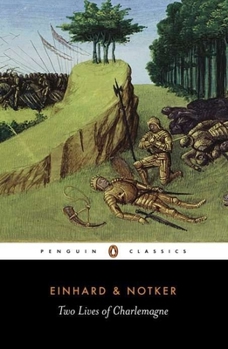Two Lives of Charlemagne
Select Format
Select Condition 
Book Overview
Two revealingly different accounts of the life of the most important figure of the Roman Empire Charlemage, known as the father of Europe, was one of the most powerful and dynamic of all medieval rulers. The biographies brought together here provide a rich and varied portrait of the king from two perspectives: that of Einhard, a close friend and adviser, and of Notker, a monastic scholar and musician writing fifty years after Charlemagne's death. For more than seventy years, Penguin has been the leading publisher of classic literature in the English-speaking world. With more than 1,700 titles, Penguin Classics represents a global bookshelf of the best works throughout history and across genres and disciplines. Readers trust the series to provide authoritative texts enhanced by introductions and notes by distinguished scholars and contemporary authors, as well as up-to-date translations by award-winning translators.
Format:Paperback
Language:English
ISBN:0140442138
ISBN13:9780140442137
Release Date:July 1969
Publisher:Penguin Classics
Length:240 Pages
Weight:0.42 lbs.
Dimensions:0.6" x 5.0" x 7.7"
Age Range:18 years and up
Grade Range:Postsecondary and higher
Customer Reviews
4 ratings
1,200 years old
Published by Thriftbooks.com User , 18 years ago
Looking at the three 'one-star' reviews this book has received, I would point out they are all written in the same style, are close in date and look suspiciously like they were all written by the same person. Yes, this is a wonderful primary source. With Einhard's story you are actually reading the work of a person who knew Charlemagne (who lived approx. 742-814AD). Prior to Charlemagne there basically was no Germanic literature. Charlemagne encouraged book learning and the writing of what had before then been either purely oral or simply not remembered. We are looking at the birth of Germanic Literature and also the birth of Germanic recorded history. Before this, (apart from a few glosses in the 7th Century) there is only the archaeological record and the writings of neighbouring literate cultures like the Romans about their Germanic neighbours to turn to for illumination. These glimpses into the minds of people whose culture and outlook on the world are both so different to our own but also has so profoundly impacted the development of our modern day life are fascinating. Charlemagne after all followed in the footsteps of the Roman Caesars in his attempt to create a great and literate civilisation and by doing so deeply influenced the Anglo-Saxons in England. Some of the earliest Saxon writings were commissioned by Charlemagne and his son, Louis the Pious. Alfred the Great was deeply influenced by his example. It was Alfred the Greats encouragement of Anglo-Saxon literature that established sound foundations for later developments in English literature. I preferred Einhard as I think he succeeded in showing Charlemagne the man to a greater degree than Notker writing a hundred years later. Already with Notker the 'legendising' of Charlemagne made him more one dimensional and also as you can see in the foot notes more inaccuracies creep into Notker's text. There is also something more primitive and 'mystical' about Einhard. Mystical, mind you when one of Charlemagne's rivals 'mysteriously' dies. ;) But this is not really a criticism of Notker as he gives a feel for the development both of Germanic culture one hundred years further on and also some insight into the making of the legend of Charlemagne.
An excellent source on the early middle ages
Published by Thriftbooks.com User , 19 years ago
As other reviewers have pointed out, this is a "source document" - that is to say, it is history written by those who witnessed the event (or in this case, personally knew the person of whom they were writing about.) As with any eye-witness, their accounts need to be taken with a dose of skepticism. With that said, _Two Lives of Charlemagne_ provides an insightful and (for the time period) a relatively complete picture of one of the most influential figures in European history. Einhard's biography provides detail about Charlemagne as king: the political challenges he faced, and the numerous reforms he made. The second account (Notker's) details the religious life of Charlemagne, placing him in an almost "saintly" light. While the veracity of events presented here may be questionable (the purpose of "history" and "biography" in the present is very different from 1300 years ago), they do provide an excellent sense of Charlemagne's time - which is why I give it 5 stars.
History isn't literature!
Published by Thriftbooks.com User , 21 years ago
Those of you who claimed this book bored you obviously thought you were picking up an Arthurian romance or some kind of fantasy/sci-fi epic. This is history, people, not an adventure story! What's more, it's history from the period in which it happened, what we call a primary source. Of course it's not going to read like a modern novel. People in the Middle Ages wanted solid content, not useless fluff. This work is great for introducing students to the life of a great leader written by someone who was actually there. I use it with my tenth grade students and they love it because it gives you a snapshot of the man under the crown.
Great medieval sources for Charlemagne
Published by Thriftbooks.com User , 25 years ago
It's really bizarre how this book has gotten all those 1-star reviews. Most of them seem to have read it thinking it was a novel, though considering the book's title they must not be very perceptive. While Einhard's Life is a little dry in parts, I greatly enjoyed Notker's. The translator's notes are very informative, particularly on the battle of Roncevalles, where Charlemagne's general Roland was killed. To someone genuinely interested in learning more about Charlemagne than what is mere common knowledge, I suggest ignoring the bad reviews and get this book.





